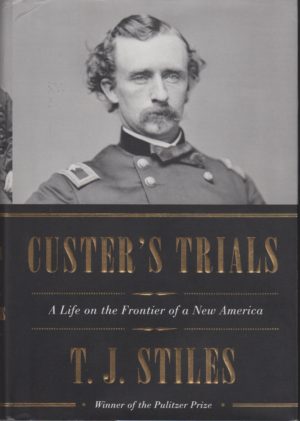
Custer’s Trials by T. J. Stiles (2015. ISBN 978-307-59264-4)
My senior paper to attain my BA in history from the University of Minnesota-Duluth was an examination of the public reputation and iconization of Lt. Col. George Armstrong Custer. In preparation for writing my work, which was completed while I was in my first year of law school (a long story that I’ll tell another time), I read contemporary newspaper and magazine accounts of Custer’s death to provide a chronology of the evolution of the man from Civil War hero to tragic victim. Of course, to Custer’s opponents on the Plains, the Lakota and the Northern Cheyenne, he was not an innocent victim of a brutal massacre but a casualty in their war for survival against the advance of the Industrial Age into territory vital to their nomadic cultures. I think I incorporated the complexities of these diverse views of the Battle at the Little Big Horn and Custer into my paper. But I did not, in any fashion, examine the psychological makeup of Custer to any great degree. That’s not an uncommon failing in articles, essays, and books trying to peer into the soul of this captivating yet morally ambiguous man. I can honestly attest that Stiles, in Custer’s Trials, puts all of Custer’s moral, racial, political, and military successes and failures under a magnifying glass to fully illuminate the man’s internal nature. Stiles succeeds in, for the first time in the history of examinations of George Armstrong Custer, giving readers a full-bodied review of the man in context. And that, given more than one hundred years have passed since Custer’s death, is no easy task.
Throughout Custer’s life, the man’s love (and contradictory ambiguity) towards his wife, partner, and biggest booster, Libbie, was always front and center, constantly on Custer’s mind even as he dallied with other women. There were, as Stiles portrays the relationship, periods of upheaval during the soldier’s long absences from the marital bed, during which it is fairly clear that Custer found satisfaction-if not love-in the warmth of another woman’s embrace. This theme, while a minor moral impingement of Custer’s standing in history, speaks volumes of the man’s lack of steady faith and virtue:
He longed for her to show real love for him again. He hoped to persuade her that she was wrong, that “however erratically wild or unseemly my conduct with others may have been, you were still to me as you always have been, the one great all absorbing object of my love”…Here the letter seems to veer away from gambling to other women. “I will not pretend to justify my conduct with others,” he wrote. “Measured by the strict laws of propriety or public opinion I was wrong. I knew it as plainly as I know it now.” Their difficulties refined his love, he claimed…Again and again, he had indulged in flirtations, perhaps even infidelities, then promised Libbie his heart was true, only to do it again.
In many respects, Custer’s Trials, which indeed does chronicle not only his emotional and marital trials with his wife, but myriad conflicts, tests, and courts martial and civilian court proceedings, is the first in-depth psychological analysis of the man. Stiles doesn’t offer the reader an ultimate scientific diagnosis for Custer’s seemingly erratic and certainly egomanical behavior, but he does lay it all out for us in bold and concise terms. His use of original source materials and secondary documents such as letters written by Custer’s strongest supporters and his most vehement critics is masterful. For anyone interested in peering into the depths of George Armstrong Custer’s soul in hopes of discerning the man’s attributes and failings, this is as good as it gets.
Masterful.
5 stars out of 5. A must read for Custerphobes.
Peace.
Mark


